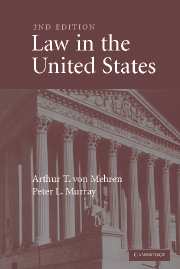Book contents
- Frontmatter
- Contents
- Preface
- CHAPTER 1 THE SOURCES OF AMERICAN LAW
- CHAPTER 2 AMERICAN COMMON LAW
- CHAPTER 3 COMPARATIVE PERSPECTIVES ON AMERICAN CONTRACT LAW
- CHAPTER 4 AMERICAN FEDERALISM
- CHAPTER 5 AMERICAN CONSTITUTIONAL LAW AND THE ROLE OF THE UNITED STATES SUPREME COURT
- CHAPTER 6 AMERICAN CIVIL JUSTICE
- CHAPTER 7 AMERICAN CRIMINAL JUSTICE
- CHAPTER 8 AMERICAN TRIAL BY JURY
- CHAPTER 9 CHOICE OF LAW, INTERNATIONAL CIVIL JURISDICTION, AND RECOGNITION OF JUDGMENTS IN THE UNITED STATES
- CHAPTER 10 THE AMERICAN LEGAL PROFESSION
- CHAPTER 11 THE UNITED STATES AND THE GLOBAL LEGAL COMMUNITY
- Index
CHAPTER 6 - AMERICAN CIVIL JUSTICE
Published online by Cambridge University Press: 05 June 2012
- Frontmatter
- Contents
- Preface
- CHAPTER 1 THE SOURCES OF AMERICAN LAW
- CHAPTER 2 AMERICAN COMMON LAW
- CHAPTER 3 COMPARATIVE PERSPECTIVES ON AMERICAN CONTRACT LAW
- CHAPTER 4 AMERICAN FEDERALISM
- CHAPTER 5 AMERICAN CONSTITUTIONAL LAW AND THE ROLE OF THE UNITED STATES SUPREME COURT
- CHAPTER 6 AMERICAN CIVIL JUSTICE
- CHAPTER 7 AMERICAN CRIMINAL JUSTICE
- CHAPTER 8 AMERICAN TRIAL BY JURY
- CHAPTER 9 CHOICE OF LAW, INTERNATIONAL CIVIL JURISDICTION, AND RECOGNITION OF JUDGMENTS IN THE UNITED STATES
- CHAPTER 10 THE AMERICAN LEGAL PROFESSION
- CHAPTER 11 THE UNITED STATES AND THE GLOBAL LEGAL COMMUNITY
- Index
Summary
This chapter does not seek to describe first-instance American civil procedure in detail. Its purpose rather is to discuss the role of civil justice in American political and economic society, to consider why the style of American civil procedure differs so greatly from the style of continental European civil procedure, and then briefly to examine two controversial features of American civil justice: collective litigation in the form of class actions and the availability of punitive as well as compensatory damages in certain types of tort claims. As will be seen, the historical role of the jury is of central importance to most of these questions. Some aspects of American jury trial are further discussed in Chapter 8.
THE ROLE OF CIVIL JUSTICE IN AMERICAN SOCIETY
Observers of the American political economy frequently express some amazement at the prominent role of civil litigation in many aspects of the American economy and society. American society is somewhat exceptional not only in the frequency with which Americans resort to court to settle their disputes but, more significantly, the scope and importance of social and economic issues that are confided to the private litigation process. In the United States, the civil justice system frequently performs functions that are discharged in other modern jurisdictions by other governmental institutions. This is true in the areas of compensation for personal injury, review and control of administrative and governmental action (or inaction), and in the area of regulation of business and moderation of the conflict between business and personal values.
- Type
- Chapter
- Information
- Law in the United States , pp. 162 - 186Publisher: Cambridge University PressPrint publication year: 2007



